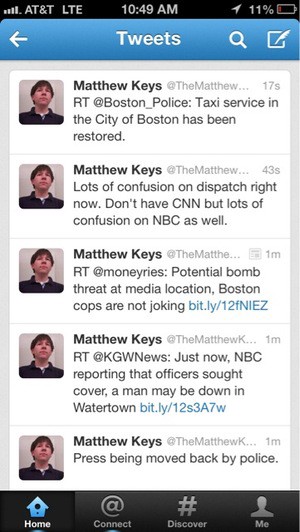Is Your Social Media Editor Destroying Your News Organization Today?
FALSE REPORT>>> RT@thematthewkeys: Just in: Suspect 2 on the ground at gunpoint.
— Mike Hayes (@michaelhayes) April 19, 2013
…perhaps if I was in a real newsroom with access to my work email, instead of shut out a month ago, I wouldn’t be working out of a bedroom
— Matthew Keys (@TheMatthewKeys) April 19, 2013
“The important thing, I think, is to — as soon as you know something that you sent out is incorrect, you correct the record. And it’s OK, I think, to make mistakes in these circumstances. You — everyone will make mistakes, and it’s kind of almost impossible to avoid them.”
— Slate’s social media editor, Jeremy Stahl.
Over the last few years, most media companies have taken on social media editors, lots of them young-ish, lots of them “digital natives.” (Some neither, of course!) Many of their jobs are construed as helping newsrooms do social media best: working with writers, working with official social media accounts, those kind of things. Some of them are more like lone Internet addicts. At the more “straight news” outfits, most of them play it pretty straight. Some of them misplace their resources: for instance, there was a big vogue for media organizations moving onto Tumblr. And then everyone found out that, while it was nice to have a stand-alone Tumblr publication, that it literally didn’t do a single thing for a news organization. Didn’t bring traffic, didn’t bring non-Tumblr attention: they operate in a black hole, essentially. If you like reblogs of your gifs, great! But this was a thing news orgs had been sold on. At lots of media organizations, decision-makers don’t know where to start with social media. And lots don’t know where their social media editors should stop and start in their work.

Over the last 24 hours, we’ve seen a lot of different approaches. For instance, Liz Heron and Rubina Fillion were busy keeping the WSJ Twitter fairly dry and rumor-free. There was a 15-hour silence from Daniel Victor at the Times. Eric Carvin likewise is busy at the AP, working.
And all around them, other real news organizations were retweeting or sharing inaccurate information.
Others were saucier, and appropriately so.
Cease your angsty thinkpieces. The FBI believes in the power of the crowd. How they nabbed Whitey Bulger: sfgate.com/business/bloom…
— Katie Rogers (@katierogers) April 19, 2013
There was a good bit of self-referential whatnots. That makes sense, kind of: social media is sometimes where you put the kind of things you’d say out loud in a newsroom.
Btw for those just joining us in AM, this is what last 12 hours have been like — ask @moneyries @buzzfeedandrew @antderosa
— Craig Kanalley (@ckanal) April 19, 2013
But then it’s not like most people in newsrooms know how to behave anyway.
If you know either of the #Boston suspects and want to talk please DM me.#manhunt
— Megyn Kelly (@megynkelly) April 19, 2013
And then there’s the… more aggressive sort of social media editor, like the infamous Ant DeRosa at Reuters — or the Daily Beast’s Brian Ries, who just pummeled Twitter relentlessly.

Why? He has 4430 followers. What does anyone gain? It looks like work, maybe, but it’s not. (Is it? Maybe it is!)
Even so, he was doing a better job than most of the people on TV. Except, you know, they were distributing half-baked semi-information to millions, instead of dozens.
OK everybody, big time out. Have to shower. We’ll pick this back up in 10 minutes. Thanks for your participation and understanding.
— Brian Ries (@moneyries) April 19, 2013
And then there was Matthew Keys, Deputy Social Media Editor at Reuters, once “considered a wunderkind of new media.” His livestream today of any word, rumor, idea, anything: just absurd!

That’s a minute’s worth of Tweets. The sheer amount of useless, misleading and random noise put out by this account is unreal.
RT @wgrz: Police source:2 Russian nationals pulled over in Niagara Falls; 4 suspicious backpacks in the car, robot & bomb techs on scene.
— Matthew Keys (@TheMatthewKeys) April 19, 2013
Okay, never mind the map.
— Matthew Keys (@TheMatthewKeys) April 19, 2013
@freemrktcptlst I’m watching him on television.
— Matthew Keys (@TheMatthewKeys) April 19, 2013
On the noise v. signal test, that’s a lose.
Also? Most of these people were just watching TV, just like you. At least if they were in a newsroom, they had more than one TV on, so I guess that’s a mild service?
What’s the point? The point is: most of this sucks for your news brand. Is it not stressful enough that your whole office is trying to verify and break news, to then have these people babbling on?
Anyway. Crazy days. Who knows how to behave? Not most of the folks on the TV. Or most of the people on the Internet. And it could be worse!
Dear fellow Jews, please stop saying nice things on television about your classmate the terrorist murderer. Thank you.
— John Podhoretz (@jpodhoretz) April 19, 2013
And, to be fair:
Can we shut up about whether Reddit helped or didn’t help already? Let’s discuss the future of journalism, I don’t know, in the future.
— Jared Keller (@jaredbkeller) April 19, 2013
We could say the same about this. The fellow makes a good point. We can pick this up next week!
Thinking it might a good idea to turn off Twitter, turn of TV and wait till tomorrow’s edition of the @nytimes with actual, reported news.
— Adam Rapoport (@rapo4) April 19, 2013
An update, from the next day:
@felixsalmon @buzzfeedben yes, it was, but generally in that blog post @choire has no idea what he’s talking about
— Anthony De Rosa (@AntDeRosa) April 20, 2013
